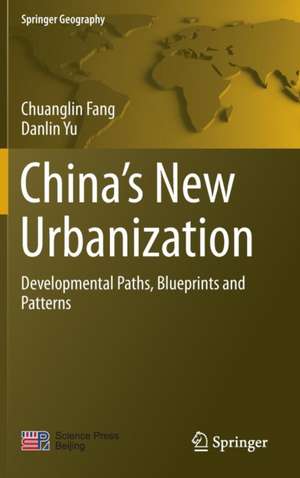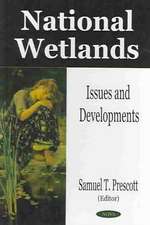China’s New Urbanization: Developmental Paths, Blueprints and Patterns: Springer Geography
Autor Chuanglin Fang, Danlin Yuen Limba Engleză Hardback – 4 mar 2016
Currently, China is aggressively promoting a so-called New Urbanization, which has been regarded as one of the primaryways to build a moderately prosperous society, to address critical issuesrelated to agriculture,rural regions and farmers, to expand domestic demand and promote industrial innovation, and to realize the China Dream.From a systematic perspective and using recently released urban data, theauthors analyze the current status of New Urbanization in China and also investigatethe various potential problems and obstacles to its concrete implementation. Based on the analysesand investigations, the authors propose strategic directions, paths and basicprinciples for China’s New Urbanization. In addition, they clearly identify the three differentmodes of New Urbanization, namely, the general mode, differentiated mode, and gradual mode.
Today, many scholars argue that China’s urban regions areexperiencing a highly unsustainable mode of development. Chinese cities areheavily burdened by theso-called “urban diseases,”which are characterized e.g.by congested traffic, polluted water and air, and a lack of open and green spaces. Traditionalurbanization, which primarily focuseson economic development, mustbe fundamentally reformed. New Urbanization, which focuses on integrated economic development,social integration and space/environmental sustainability, or simply put, on the quality ofurbanization, has been called for to provide a potential “cure” for these urban diseases. Due to the vastness of China’spopulation and its rapidly growing economic, political and cultural relationshipswith the rest of the world,the book demonstrates thatthe success of this New Urbanization is critical not only to the future of urban China,but also the future of urbanization worldwide.
Thebook offers a valuable referencework for all researchers, graduate student and policy makers interestedin China’s urban development.
| Toate formatele și edițiile | Preț | Express |
|---|---|---|
| Paperback (1) | 723.98 lei 6-8 săpt. | |
| Springer Berlin, Heidelberg – 7 apr 2018 | 723.98 lei 6-8 săpt. | |
| Hardback (1) | 729.99 lei 6-8 săpt. | |
| Springer Berlin, Heidelberg – 4 mar 2016 | 729.99 lei 6-8 săpt. |
Din seria Springer Geography
- 18%
 Preț: 961.55 lei
Preț: 961.55 lei - 15%
 Preț: 665.01 lei
Preț: 665.01 lei - 18%
 Preț: 792.72 lei
Preț: 792.72 lei - 20%
 Preț: 564.78 lei
Preț: 564.78 lei - 15%
 Preț: 533.88 lei
Preț: 533.88 lei - 18%
 Preț: 1224.36 lei
Preț: 1224.36 lei - 18%
 Preț: 949.73 lei
Preț: 949.73 lei - 18%
 Preț: 1115.46 lei
Preț: 1115.46 lei - 18%
 Preț: 1115.46 lei
Preț: 1115.46 lei - 18%
 Preț: 730.35 lei
Preț: 730.35 lei -
 Preț: 441.37 lei
Preț: 441.37 lei - 18%
 Preț: 1004.19 lei
Preț: 1004.19 lei - 18%
 Preț: 949.55 lei
Preț: 949.55 lei - 15%
 Preț: 644.30 lei
Preț: 644.30 lei -
 Preț: 398.74 lei
Preț: 398.74 lei - 18%
 Preț: 955.25 lei
Preț: 955.25 lei - 18%
 Preț: 787.15 lei
Preț: 787.15 lei - 18%
 Preț: 1003.38 lei
Preț: 1003.38 lei - 18%
 Preț: 897.14 lei
Preț: 897.14 lei - 18%
 Preț: 1117.03 lei
Preț: 1117.03 lei - 18%
 Preț: 1120.18 lei
Preț: 1120.18 lei - 18%
 Preț: 1128.08 lei
Preț: 1128.08 lei - 18%
 Preț: 726.37 lei
Preț: 726.37 lei - 18%
 Preț: 964.54 lei
Preț: 964.54 lei - 15%
 Preț: 647.40 lei
Preț: 647.40 lei - 15%
 Preț: 646.62 lei
Preț: 646.62 lei - 15%
 Preț: 640.71 lei
Preț: 640.71 lei - 18%
 Preț: 2154.04 lei
Preț: 2154.04 lei - 15%
 Preț: 648.05 lei
Preț: 648.05 lei - 24%
 Preț: 1118.09 lei
Preț: 1118.09 lei -
 Preț: 391.61 lei
Preț: 391.61 lei - 18%
 Preț: 961.55 lei
Preț: 961.55 lei - 18%
 Preț: 948.16 lei
Preț: 948.16 lei - 18%
 Preț: 1563.24 lei
Preț: 1563.24 lei - 15%
 Preț: 647.27 lei
Preț: 647.27 lei - 24%
 Preț: 857.93 lei
Preț: 857.93 lei - 24%
 Preț: 1139.71 lei
Preț: 1139.71 lei - 5%
 Preț: 1116.73 lei
Preț: 1116.73 lei - 20%
 Preț: 551.32 lei
Preț: 551.32 lei - 15%
 Preț: 637.13 lei
Preț: 637.13 lei - 15%
 Preț: 642.03 lei
Preț: 642.03 lei - 18%
 Preț: 940.39 lei
Preț: 940.39 lei -
 Preț: 395.09 lei
Preț: 395.09 lei -
 Preț: 365.45 lei
Preț: 365.45 lei - 18%
 Preț: 960.13 lei
Preț: 960.13 lei - 24%
 Preț: 643.01 lei
Preț: 643.01 lei
Preț: 729.99 lei
Preț vechi: 890.23 lei
-18% Nou
Puncte Express: 1095
Preț estimativ în valută:
139.70€ • 151.69$ • 117.35£
139.70€ • 151.69$ • 117.35£
Carte tipărită la comandă
Livrare economică 23 aprilie-07 mai
Preluare comenzi: 021 569.72.76
Specificații
ISBN-13: 9783662494462
ISBN-10: 3662494469
Pagini: 331
Ilustrații: XIX, 329 p. 37 illus., 31 illus. in color.
Dimensiuni: 155 x 235 x 21 mm
Greutate: 0.67 kg
Ediția:1st ed. 2016
Editura: Springer Berlin, Heidelberg
Colecția Springer
Seria Springer Geography
Locul publicării:Berlin, Heidelberg, Germany
ISBN-10: 3662494469
Pagini: 331
Ilustrații: XIX, 329 p. 37 illus., 31 illus. in color.
Dimensiuni: 155 x 235 x 21 mm
Greutate: 0.67 kg
Ediția:1st ed. 2016
Editura: Springer Berlin, Heidelberg
Colecția Springer
Seria Springer Geography
Locul publicării:Berlin, Heidelberg, Germany
Cuprins
China’s New Urbanization and Development Bottlenecks.- The Developmental Strategies and Basic Principles for China’s New Urbanization.- Basic Modes for China’s New Urbanization Development.- Spatial Pattern of China’s New Urbanization.- Comprehensive Regionalization for China’s New Urbanization Development.- Quality of China’s New Urbanization and Ways for Improvement.
Notă biografică
Dr. Chuanglin Fang obtained his Ph.D. in Geography in 1998 from theInstitute of Geography at the Chinese Academy of Sciences-National PlanningCommittee. Dr. Fang is a professor of the Institute of Geographic Science andResources Research, Chinese Academy of Sciences. He is also a DistinguishedProfessor of “Changjiang Scholars” and “Tianshan Scholars” and a doctoralfaculty. Dr. Fang is currently a member of the International Society of Cityand Regional Planners, executive council member of the Regional Science Association(RSA) China Division, director of the Human Geography Specialty Committee ofthe Chinese Geographic Society, Vice President of the Chinese Urban and RuralDevelopment Think Tank Association, executive council member of the ChineseUrban Science Association, executive council member of Chinese Urban EconomicsStudies, council member of Chinese Urban Planning Association, council memberof China’s Urbanization Promotion Association, and council memberof theChina’s Geographic Society. In recent years, Dr. Fang has mainly engaged in theresearch and teaching of urban geography, sustainable development of urbanagglomerations, the process of urbanization and its impact on theeco-environments. Dr. Fang has served and is still serving as the principalinvestigator of over 120 various projects funded by the Chinese NationalNatural Science Foundation (Key Projects), Chinese National Social ScienceFoundation (Key Projects), and the Chinese National “973” Projects, among manyothers. Dr. Fang is a very prolific scholar with a publication record of over20 edited manuscripts or monographs, and over 330 peer-reviewed journalarticles (among them, 50 are published in journals that are indexed inSCI/SSCI).
Dr. Danlin Yu obtained his Ph.D. in Geography from the University ofWis-consin-Milwaukee in 2005. He is currently a tenured Associate Professor ofUrban Geography and GIS at Montclair State University. Dr. Yu’smain researchareas include urban and regional development planning, spatial data analysis,geographic information science and technology, geocomputation, simulation ofcomplex systems, big data mining and analysis and its application in human andnatural systems. So far, Dr. Yu has published more than 60 journalarticles/book chapters in these areas in both Chinese and English, among them,more than 40 papers are published in SCI / SSCI indexed journals. Dr. Yu’sresearch in these areas has gained domestic and international influences. Dr.Yu has been actively using R language to write freely available spatial dataanalysis software packages. He is one of the co-authors of the SPGWR packagethat is for Geographically Weighted Regression Analysis. The package hasalready received a wide range of applications in the world. Since 2008, Dr. Yuwas invited by the Georgia National Science Foundation as internationalevaluation experts. Dr. Yu currently serves as an Associate Editor for theJournal of Urban Planning and Development since 2012. From 2013 onwards, Dr. Yuwas awarded the “Tianshan Scholar” title by the Xinjiang Uyghur AutonomousRegion, and housed in Xinjiang University.
Dr. Danlin Yu obtained his Ph.D. in Geography from the University ofWis-consin-Milwaukee in 2005. He is currently a tenured Associate Professor ofUrban Geography and GIS at Montclair State University. Dr. Yu’smain researchareas include urban and regional development planning, spatial data analysis,geographic information science and technology, geocomputation, simulation ofcomplex systems, big data mining and analysis and its application in human andnatural systems. So far, Dr. Yu has published more than 60 journalarticles/book chapters in these areas in both Chinese and English, among them,more than 40 papers are published in SCI / SSCI indexed journals. Dr. Yu’sresearch in these areas has gained domestic and international influences. Dr.Yu has been actively using R language to write freely available spatial dataanalysis software packages. He is one of the co-authors of the SPGWR packagethat is for Geographically Weighted Regression Analysis. The package hasalready received a wide range of applications in the world. Since 2008, Dr. Yuwas invited by the Georgia National Science Foundation as internationalevaluation experts. Dr. Yu currently serves as an Associate Editor for theJournal of Urban Planning and Development since 2012. From 2013 onwards, Dr. Yuwas awarded the “Tianshan Scholar” title by the Xinjiang Uyghur AutonomousRegion, and housed in Xinjiang University.
Textul de pe ultima copertă
This book answers the call for NewUrbanization, and proposesa “5+9+6” nationalspatial layout plan for the urbanizationof the 770 major cities in China. This macro pattern is based on a fewmajor metropolises at the center, and other cities supporting and benefitting from thesemetropolises to form a pyramid-like urban hierarchical system. The book also presents a comprehensiveregionalization plan for China’s New Urbanization and strategic approaches to improving the quality of thisNew Urbanization.
Currently, China is aggressively promoting a so-called New Urbanization, which has been regarded as one of the primaryways to build a moderately prosperous society, to address critical issuesrelated to agriculture,rural regions and farmers, to expand domestic demand and promote industrial innovation, and to realize the China Dream.From a systematic perspective and using recently released urban data, theauthors analyze the current status of New Urbanization in China and also investigatethe various potential problems and obstacles to its concrete implementation. Based on the analysesand investigations, the authors propose strategic directions, paths and basicprinciples for China’s New Urbanization. In addition, they clearly identify the three differentmodes of New Urbanization, namely, the general mode, differentiated mode, and gradual mode.
Today, many scholars argue that China’s urban regions areexperiencing a highly unsustainable mode of development. Chinese cities areheavily burdened by theso-called “urban diseases,”which are characterized e.g.by congested traffic, polluted water and air, and a lack of open and green spaces. Traditionalurbanization, which primarily focuseson economic development, mustbe fundamentally reformed. New Urbanization, which focuses on integrated economic development,social integration and space/environmental sustainability, or simply put, on the quality ofurbanization, has been called for to provide a potential “cure” for these urban diseases. Due to the vastness of China’spopulation and its rapidly growing economic, political and cultural relationshipswith the rest of the world,the book demonstrates thatthe success of this New Urbanization is critical not only to the future of urban China,but also the future of urbanization worldwide.
Thebook offers a valuable referencework for all researchers, graduate student and policy makers interestedin China’s urban development.
Currently, China is aggressively promoting a so-called New Urbanization, which has been regarded as one of the primaryways to build a moderately prosperous society, to address critical issuesrelated to agriculture,rural regions and farmers, to expand domestic demand and promote industrial innovation, and to realize the China Dream.From a systematic perspective and using recently released urban data, theauthors analyze the current status of New Urbanization in China and also investigatethe various potential problems and obstacles to its concrete implementation. Based on the analysesand investigations, the authors propose strategic directions, paths and basicprinciples for China’s New Urbanization. In addition, they clearly identify the three differentmodes of New Urbanization, namely, the general mode, differentiated mode, and gradual mode.
Today, many scholars argue that China’s urban regions areexperiencing a highly unsustainable mode of development. Chinese cities areheavily burdened by theso-called “urban diseases,”which are characterized e.g.by congested traffic, polluted water and air, and a lack of open and green spaces. Traditionalurbanization, which primarily focuseson economic development, mustbe fundamentally reformed. New Urbanization, which focuses on integrated economic development,social integration and space/environmental sustainability, or simply put, on the quality ofurbanization, has been called for to provide a potential “cure” for these urban diseases. Due to the vastness of China’spopulation and its rapidly growing economic, political and cultural relationshipswith the rest of the world,the book demonstrates thatthe success of this New Urbanization is critical not only to the future of urban China,but also the future of urbanization worldwide.
Thebook offers a valuable referencework for all researchers, graduate student and policy makers interestedin China’s urban development.
Caracteristici
The first book available on the development trend and constraints of China’s urbanization Includes the principles, objectives, patterns, paths, layouts, measurements, and quality improvements in the coming 20 years The first book that systematically both introduces China’s urbanization development to the world and is published by a global publisher





